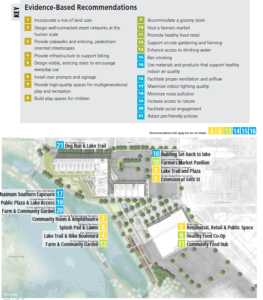Top Story
Trustee Colleen Carey Aspires to Build a Health-Focused Community in Lyndale Gardens
August 26, 2015
Chalk it up to her midwestern roots, but real estate developer and ULI trustee Colleen Carey does not mince words. At ULI’s Housing Opportunity 2015 conference in July, she said out loud what other developers may have only thought to themselves about the difficulty of securing financing for mixed-income projects. She lamented the siloed nature of housing finance, with market-rate investors on one side and affordable housing investors on the other, leaving little room for collaboration between the two.
“We don’t get any innovation in this space because the capital markets don’t like innovation,” she said on a panel devoted to the subject. “We need a fundamental change in how we deliver this product.”
She had just shared her difficulties raising capital for Lyndale Gardens, a proposed mixed-use development in Richfield, Minnesota, an inner-ring suburb of Minneapolis, on the site of a demolished garden and nursery center. Initially, Carey’s firm, the Cornerstone Group, had proposed developing apartments that were 20 percent affordable and 80 percent market-rate, but she could not secure financing for this particular income mix. Equity
investors of market-rate housing she approached were uncomfortable with the affordable component, while investors of low-income housing tax credits, or LIHTCs, didn’t want such a small piece of the deal.
What also makes Lyndale Gardens an unconventional choice for investors is the amount of new public infrastructure that Cornerstone Group is proposing in its plan. Many of the upgrades follow the recommendations found in ULI’s Building Healthy Places Toolkit (see graphic). These amenities, in addition to commercial spaces, will form what Cornerstone Group calls a “town center” and will be open to all Richfield residents. They include an amphitheater and a farmers market, splash pads and other children’s play spaces, a 10,000-square-foot (929 sq m) community garden, shoreline improvements to Richfield Lake, and paved walking trails to nearby Wood Lake Nature Center. In addition, Lakewinds Natural Foods has built a new grocery store near the site.
“It’s been a bit of a challenge to get it done because it doesn’t look like everything else,” Carey said in an interview with ULI Connect. “I always understood that this was going to be a tough sell to private capital, but I guess I underestimated the rigidity of the box.”
In the end, Carey had to strip out the affordable housing from Lyndale Gardens, leaving all 156 units market-rate. She also separated the strands of the deal into discrete components—public infrastructure, retail, and housing—to secure financing for each. The public improvements, for example, will be overseen by a separate nonprofit entity, while the retail and housing will be pursued by the Cornerstone Group as a private developer. Carey is still seeking equity investors for the housing and retail components.
A Need for Walkable Places
Lyndale Gardens couldn’t come at a better time for Richfield, a growing suburb that is shifting from a being a bedroom community to a city in its own right. In 2003, electronics giant Best Buy relocated its headquarters to Richfield; its proximity to the airport, downtown Minneapolis, and Mall of America make the suburb an ideal spot for young professionals and empty nesters wanting an urban lifestyle combined with convenient access to jobs and amenities.

At the ULI Housing Opportunity conference in July, Colleen Carey shared her experience raising private equity for Lyndale Gardens, a proposed mixed-use development heavily-focused on health impacts and public amenities.
And for the past 30 years, little multifamily construction has occurred in Richfield, a 1950s-era suburb that is looking to reinvent itself. “Richfield has a real need for new product, housing choices, and walkable places,” Carey said. For their part, city officials have been enthusiastic supporters of the project. Although they are eager for Cornerstone Group to break ground on Lyndale Gardens, they have told Carey to “take your time and get it right,” she said.
Commitment to Measuring Health Impacts
Lyndale Gardens is also a reflection of the Cornerstone Group’s mission-oriented focus. Although it is a for-profit company, Cornerstone wears its commitment to social equity, health, and sustainable development on its sleeve. “We’re trying to push the envelope,” Carey said. “It’s not just about the bricks and the mortar or building a pretty building.”
With Lyndale Gardens, the goal is not merely to build the infrastructure and amenities, but also to ensure that residents and others actually use them and are improving their physical, social, and mental well-being. Programming of the various spaces and community engagement will be critical to the health initiative’s success, said Stephen Klimek, the firm’s community design coordinator.
In the spirit of defining health broadly, the Cornerstone Group plans to host an artist-in-residence at Lyndale Gardens and recently hired two artists. Their role will be to engage residents in creative expression and place-making exercises and projects. “We want to make sure that art and creativity [are] part of people’s conception of health and well-being,” Klimek said.
Most important, perhaps, is Cornerstone’s commitment to measuring its impact on health through data and self-reporting by Lyndale Gardens’ residents and other users of the space. It is collaborating closely with HealthPartners, a major insurance company, the local parks and recreation and public health departments, as well as schools to collect baseline data and learn about Richfield’s greatest health needs and priorities. So far, the firm has identified seniors’ health, maternal/child health, and food access/nutrition as areas of focus.
“These partnerships will help us tie those design initiatives to health outcomes,” Klimek said. “A major portion of this project provides a public benefit, and as such it’s hard for its value to reach into our pro forma. But if we can show our success through qualitative and quantitative measures, not only can we justify the cost to investors, but we can demonstrate cost-savings on a whole neighborhood at the deeper level of preventative care.”
